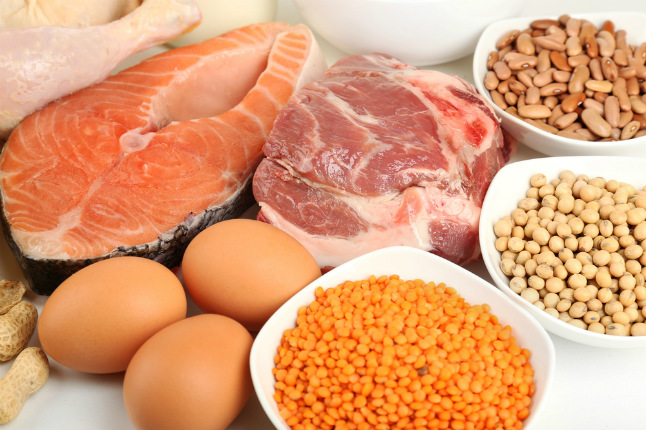Healthy food: All about protein
Feb 12, 2017 under Food and Drinks , Health and Fitness

Protein is an essential nutrient, responsible for multiple functions in your body, including building tissue, cells and muscle, as well as making hormones and anti-bodies. Everyone needs protein in their diet, but if you do endurance sports or weight training you may need to increase your protein intake, and to factor it into your training routine at specific times to reap its muscle-boosting benefits.
How much protein should I eat?
For most people a daily dose of around 0.8-1g of protein per 1kg of body weight is recommended. For strength athletes 1.2-1.7g per kg of body weight is recommended per day, with a recommendation of 1.2-1.4g per kg of body weight per day for endurance athletes. After exercise, protein is particularly important since muscles need it to recover and grow. A portion of protein (15-25g) is recommended within 30 minutes of exercise, when your muscles are particularly receptive to protein synthesis.
For most of us, our daily protein requirements are easily achieved by a healthy, balanced diet. The Department of Health advises adults to avoid consuming more than twice the recommended daily intake of protein (55.5g for the average man and 45g for the average woman). This is because there is evidence that, in the long term, consuming too much protein can lead to health issues such as an increased risk of osteoporosis and a worsening of an existing kidney problem.
One of the main issues with our Western diet is that most of our breakfasts and lunches are low in protein but high in carbohydrates, with a protein-packed evening meal. It is better to aim to spread your protein intake out throughout the day.
Good protein sources
Eggs
A medium egg has around 6g of protein in an easily digestible form. An omelette is a good way to start the day and is a good recovery snack too.
Milk
Dairy foods are packed with protein and contain bone-building calcium, too. Chocolate milk is the age-old recovery food after exercise, since it contains energy-replenishing carbohydrates and a blend of both slow and fast release whey and casein proteins. You can get the same recovery-boosting effects from a milk-based fruit smoothie
Yogurt
A combination of casein and whey protein, yogurt is a great protein-rich food. Since most of the lactose is removed, it can work for most people who are lactose intolerant.
Fish and seafood
Fish and seafood are good sources of protein and are typically low in fat. While slightly higher in fat than other varieties, salmon packs in heart-healthy omega-3 fatty acids which can reduce joint stiffness and inflammation.
Soya
If you’re dairy intolerant, eating soya protein foods such as tofu and soya-based drinks will help post-recovery, plus they can help to lower cholesterol and may reduce the risk of heart disease.
Pistachio nuts
Nuts such as pistachios are a practical protein choice if you’re on the move. Around 50 pistachio nuts will provide 6g of protein, plus sodium and potassium, the electrolytes lost in sweat during exercise.
Pork
High quality proteins also contain branched-chain amino acids (BCAAs), which are key in supporting muscle recovery. Leucine, in particular, makes up one third of muscle protein and helps to stimulate repair after exercise. Pork is one of the richest sources of leucine and therefore a great addition to a post-exercise meal or snack. Eggs, chicken and lean beef also provide good amounts of leucine.
Chicken and turkey
When it comes to animal protein, opt for lean protein from white meat poultry such as chicken and turkey.
Beans and pulses
These are great, value-for-money protein sources. Beans and pulses are also a good source of iron and fibre.


